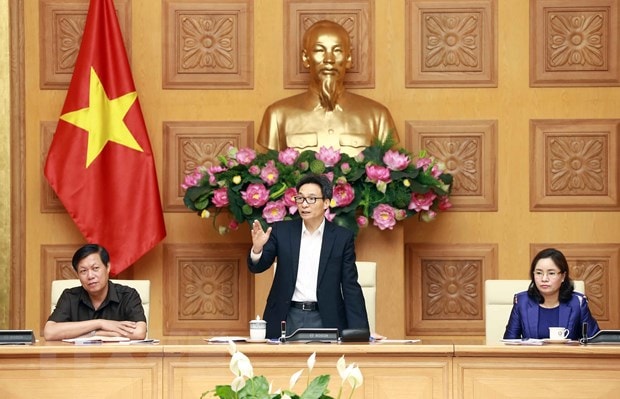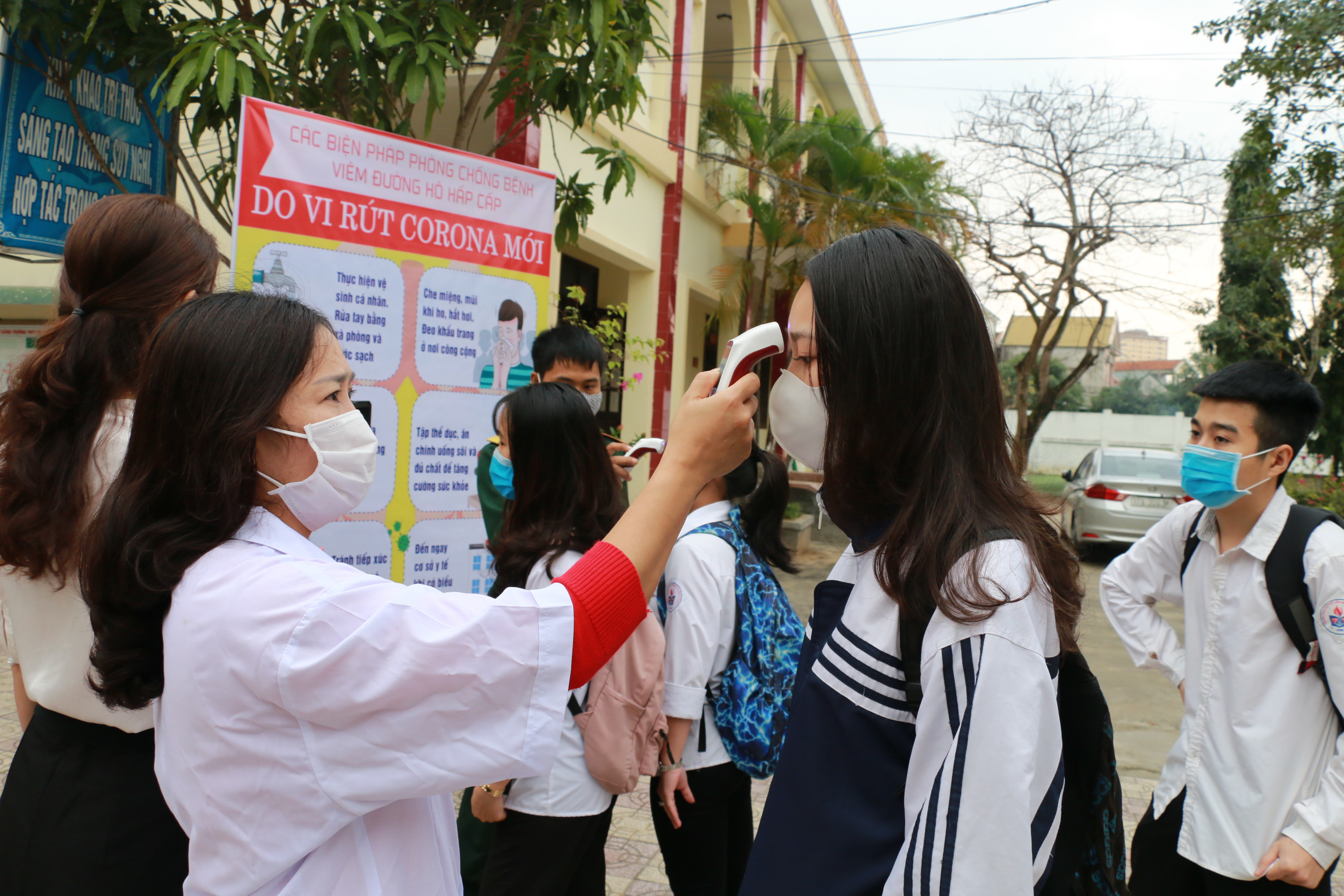Deputy Prime Minister Vu Duc Dam: Must change tactics in fighting Covid-19 epidemic
Deputy Prime Minister Vu Duc Dam emphasized: “This is only the opening victory, not the whole war. Therefore, we cannot relax even for a minute. The actual situation has changed, we must have a changed strategy."
 |
| Deputy Prime Minister Vu Duc Dam speaks at the meeting. Photo: Doan Tan/VNA |
On the morning of March 2, at the Government Headquarters, Deputy Prime Minister Vu Duc Dam, Head of the National Steering Committee for Prevention and Control of the SARS-CoV-2 virus (COVID-19 epidemic) chaired a meeting to deploy epidemic prevention and control measures in the current period.
At the meeting, the Steering Committee assessed that, up to now, Vietnam is still controlling the situation well; promptly and proactively implementing epidemic prevention and control work.
Since February 13, Vietnam has recorded no new cases of infection. Son Loi Commune, Binh Xuyen District, Vinh Phuc Province has been quarantined for 20 days and is expected to lift the blockade at 0:00 on March 3.
Accordingly, Vietnam's COVID-19 prevention and control system (from prevention, detection, isolation to treatment) has been practiced through practice as well as training programs of specialized agencies in the health sector.
Deputy Prime Minister Vu Duc Dam emphasized: “This is only the opening victory, not the whole war. Therefore, we cannot relax even for a minute. The actual situation has changed, we must have a changed strategy.”
Instead of focusing on preventing and detecting the epidemic mainly from China as before, Deputy Prime Minister Vu Duc Dam said that up to now, the epidemic has appeared in many different places such as South Korea, Iran, Italy and more than 60 other countries and territories in the world.
 |
| To prevent the epidemic, Nguyen Truong To High School (Nghe An) measured students' body temperature at the school gate on the first day back to school. Photo: My Ha |
Meanwhile, Vietnam, like many other countries in the world, cannot "close its borders", so it is increasingly difficult to detect the source of the epidemic. Many countries in the world have considered plans to prevent transmission in the community.
“We must anticipate all situations, take practical steps, not be subjective, and always be ready to respond when new infections appear. Because it is very possible that in just a moment, tomorrow or the day after, there will be one or even many infections. Whether or not the source of infection is identified, we must quickly isolate, treat promptly, and thoroughly contain the area to avoid spreading it to the community. Disease prevention and control work must not be lax; we must continue to persevere and adhere to the principles of epidemic prevention,” the Deputy Prime Minister suggested.
According to Deputy Prime Minister Vu Duc Dam, "from 0:00 on March 3, Vietnam will temporarily suspend unilateral visa exemption for Italian citizens."
Regarding the situation of Vietnamese people returning from South Korea, Deputy Prime Minister Vu Duc Dam proposed strict implementation of centralized quarantine; after having sufficient evidence confirming that they have not been in contact with, resided in, or passed through two epidemic areas of South Korea (Daegu and North Gyeongsang), these citizens will be brought back to quarantine in the community, workplace, or place of residence.
 |
| Isolation area for treating patients in Ky Son district (Nghe An). Photo courtesy |
Emphasizing the important role of Party committees, authorities, and the Fatherland Front in epidemic prevention and control in localities, Deputy Prime Minister Vu Duc Dam requested competent agencies to verify information with families whose relatives returned from epidemic areas; urge, monitor, and ensure strict implementation of quarantine regulations.
Besides advocacy and propaganda work, the Deputy Prime Minister stated that we are determined to deal with those who do not have correct awareness and make dishonest declarations.
To prevent the risk of infection in the community, people not only strictly follow the regulations on disease prevention and control for themselves, their families and their residences, but also participate in detecting people at risk of infection and notify health agencies and local authorities.
Regarding Koreans entering Vietnam, the Deputy Prime Minister requested that the authorities proactively coordinate the destinations of flights from Korea. In the coming time, flights from Korea to Vietnam will mainly serve Vietnamese citizens returning home.
By controlling visas, Korean citizens entering with diplomatic passports, official passports, and ordinary passports (with necessary and important work in socio-economic development and maintaining relations between the two countries) are considered to enter Vietnam with guaranteed conditions.
In addition, the authorities continue to promote training and application of information technology for medical facilities from the commune level, connecting with central experts; thereby providing specific and detailed instructions on what to do when detecting people showing signs of infection; thereby assigning appropriate treatment routes.
"This is a necessary transition in the coming time" - the Deputy Prime Minister emphasized.
Regarding the positive signs in the research of test kits, the Deputy Prime Minister requested the Ministry of Health and the Ministry of Science and Technology to urgently work in the spirit of "counting by the hour" to soon have test kits; at the same time, soon put them into production to expand the testing area.
Vietnam currently has more than 10,000 people in quarantine. Having early tests ensures that quarantined people and the community are more secure in the face of complicated epidemic developments.
According to the Ministry of Health's report, as of 11:30 a.m. on March 2, the world recorded 89,068 cases of COVID-19 in 67 countries and territories, of which China had 80,026 cases in 31/31 provinces and cities.
The world recorded 3,046 deaths, including 2,913 in mainland China, 22 in South Korea, 54 in Iran, 12 in Japan (including 6 on the Diamond Princess), 1 in the Philippines, 2 in Hong Kong (China), 34 in Italy, 2 in France, 1 in Taiwan (China), 2 in the US, 1 in Thailand, 1 in Australia, and 1 in San Marino.
